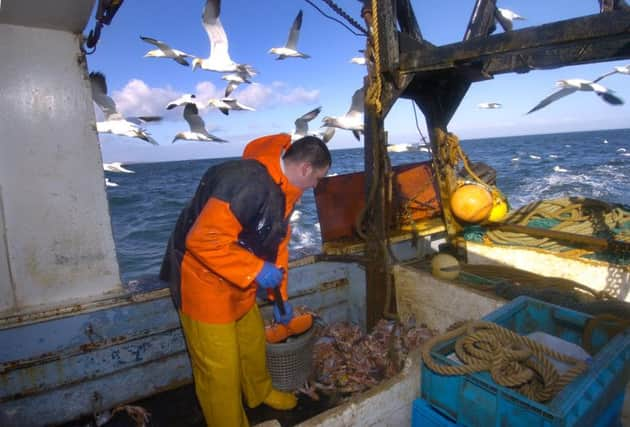No point restricting our deep-water fishermen


FISHING is a tough job and one that is made all the harder by our fishermen having to endure a continuing stream of misconceptions about their industry.
We often, for example, read in the media about industrial-scale fishing or factory trawlers “Hoovering up” fish stocks. To use such negative terminology in the case of Scottish waters is arrant nonsense for it simply does not happen, yet these myths are still peddled by the misinformed, or those with other agendas to pursue. The underlying message from some environmental groups seems to be when it comes to fishing– small is good, big is bad.
Advertisement
Hide AdAdvertisement
Hide AdIn the Scottish Fishermen’s Federation, we are proud that our membership ranges from those who work on small creel vessels right up to those who fish for far mackerel and herring far offshore in large pelagic vessels. This diversity is something to be celebrated and underlines the dynamism that is at the heart of Scottish fishing. In short, for there to be a sustainable fishing industry, there needs to be balance of activity ranging across the full spectrum of sectors and vessel sizes.
Our members’ small inshore one- or two-man vessels working for lobster, crab and langoustine support many fragile rural communities. They play a crucial role in catching much sought-after shellfish that are destined for some of the finest restaurants in Europe – and increasingly for those in Scotland too. It a great advert for Scottish tourism now to be able to visit Scottish hotels, restaurants and pubs and find fresh langoustines on the menu.
But these small craft can only work close inshore waters – to go any further offshore would be downright dangerous. Furthermore, our inshore waters can only take so much fishing pressure. One only has to look at the Mediterranean and its huge abundance of very small fishing boats to see the negative impact that this has had on inshore fish stocks.
The next stage up in the scale of things is our larger vessels generally ranging up to around 75ft in length. Indeed, it could be argued that this too is small-scale fishing – it all depends on your definition.
Most of these boats are family or locally owned and have crew sizes ranging from four to seven personnel. They work the more offshore grounds for increasingly abundant stocks of fish such as cod and haddock and play a crucial role in putting the fish on our plates. And don’t just to take my word that these stocks are increasing, it is what the scientific evidence from the International Council for the Exploration of the Sea (ICES) is saying. ICES data also shows that fishing pressure in the north-east Atlantic has fallen by an astonishing 50 per cent since 2000.
In the Scottish fleet, there are also a handful of larger whitefish vessels, which for part of the year work even further offshore areas to the west and north of Scotland for deep-water species. This sector is currently under sustained pressure from environmentalists calling on the European Commission to close down these fisheries for good.
Yes, these stocks are biologically different and reproduce slower than those in shallower waters, but are these really sound reasons to stop this type of fishing altogether and deny ourselves a sustainable food resource? With sensible management and careful controls, including the avoidance of vulnerable seabed features, then these fisheries too have an important role to play in ensuring our food security. If you take away one source of protein to feed the world, then it is simply going to have to come from somewhere else – and probably from a less sustainable source.
The largest vessels in the Scottish fleet belong to the pelagic sector, targeting mainly ocean-swimming fish such as mackerel and herring, and they are among the most heavily regulated fisheries in the world. These vessels work a clean fishery where there is virtually no by-catch of unwanted fish. The size of the fish is sampled by jigging lines before fishing commences to make sure they are mature and of a marketable size to catch. Only then will the boats shoot their nets.
Advertisement
Hide AdAdvertisement
Hide AdThe result is our pelagic stocks are healthy and robust. Although the size of the fleet is relatively small – at just under 30 vessels – each pelagic boat carries many more crew than smaller vessels and the industry supports a large onshore processing sector, employing over 2,000 people. Our mackerel sector is worth over £400 million to the Scottish economy each year.
The key to sustainable fishing, therefore, lies in a balanced structure, with each segment of the fleet complementing the other. Despite the huge value and importance of small-scale fishing, if we were focus just on that sector alone – as seems to be the want of some in the environmental movement – it is a bit like saying you can feed the world by allotment farming alone.
• Bertie Armstrong is chief executive of the Scottish Fishermen’s Federation. www.sff.co.uk